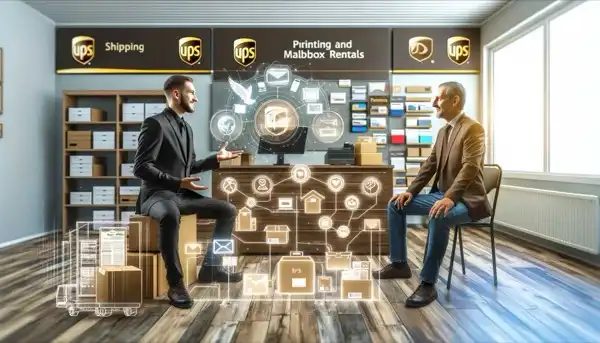Starting a UPS Store Business Insights for Aspiring Entrepreneurs
Hello, folks! John Doe here. Today, let’s dive into the world of UPS Store franchises.
Whether you’re an aspiring entrepreneur or simply curious about franchise opportunities, this post has something for you.
When I first started consulting, the idea of owning a franchise seemed daunting. However, hearing stories from successful franchise owners changed my perspective.
Imagine you’re piecing together a puzzle. Each piece, or story, fits perfectly into the larger picture of what it takes to succeed in the UPS Store franchise world.
We’ll explore these stories, trends, and practical insights that can help you decide if this path is right for you. Let’s get started on this exciting journey!
Lessons from Leading the UPS Store Industry

UPS Store Franchise Overview: UPS Store Opportunities and Franchise Market Analysis
Running a UPS Store franchise is like driving a well-oiled machine. The business model offers a variety of essential services: shipping, printing, mailboxes, and notary services. This versatility makes it a strong choice for aspiring business owners.
Key features include:
- Diverse Service Offerings: Multiple services attract a steady stream of customers.
- Strong Brand Recognition: The globally recognized UPS brand lends credibility and attracts customers.
- Support System: Franchisees receive comprehensive training and ongoing support from the franchisor.
UPS Store
The UPS Store stands out in the competitive franchise market due to its solid presence and continuous innovation.
Success hinges on:
- Location: A prime spot can significantly boost sales.
- Customer Service: Great service fosters loyalty.
- Adaptability: Staying ahead of trends and customer needs is crucial.
UPS Store Franchise Success Stories: Effective Business Models and Franchise Owner Interviews

Interviewee Introductions
Let’s meet two successful UPS Store franchise owners who have turned their dreams into reality.
Jake from Los Angeles has been running his UPS Store for 10 years. He’s proactive, friendly, and passionate about customer service.
Emma from Austin has managed her UPS Store for 5 years. She’s creative, solution-oriented, and values strong customer relationships.
Starting a UPS Store Business: Motivation and Initial Steps
Both Jake and Emma were driven by a desire to be their own bosses and saw the UPS Store as a solid opportunity.
Jake pooled his savings and took a small business loan. Emma, on the other hand, secured funding through a combination of personal savings and a family loan.
Their preparation involved extensive market research, attending training sessions provided by UPS, and setting up their stores with all the necessary equipment and staff.
Current UPS Store Franchise Business Operations and Market Analysis

Jake and Emma’s daily operations are a testament to their dedication and strategic planning.
Jake’s Current Operations
Jake’s store is a hive of activity. He focuses on streamlining processes and ensuring that customers receive top-notch service every time they walk through the door. His main metrics for success are customer satisfaction and repeat business.
Emma’s Current Operations
Emma’s store is equally bustling. She prides herself on innovation, constantly introducing new services and refining existing ones to meet customer needs. Her success metrics include customer feedback and the number of new customers acquired through word-of-mouth.
Business Performance
Both Jake and Emma measure their success through various key performance indicators:
- Customer Satisfaction: High satisfaction rates lead to loyal customers.
- Revenue Growth: Steady increase in sales indicates business health.
- Operational Efficiency: Streamlined processes reduce costs and improve service.
UPS Store Franchise Reviews: Franchise Benefits and Challenges
Benefits from Jake’s Perspective
Jake highlights several benefits of owning a UPS Store franchise:
- Stable Revenue: The diverse range of services ensures a steady income.
- Strong Support: The franchisor provides excellent training and ongoing support.
- Community Engagement: His store has become a vital part of the local community.
Challenges from Jake’s Perspective
However, Jake also notes some challenges:
- High Initial Investment: Starting costs can be significant.
- Regulatory Hurdles: Navigating various regulations can be complex.
- Competitive Market: Staying ahead requires constant innovation and marketing.
Benefits from Emma’s Perspective
Emma shares her positive experiences:
- Customer Relationships: Building strong relationships with customers is deeply rewarding.
- Growth Opportunities: There are numerous opportunities to expand and introduce new services.
- Brand Strength: The UPS brand attracts a loyal customer base.
Challenges from Emma’s Perspective
Emma also faces some challenges:
- Operational Costs: Managing high operational costs requires careful planning.
- Market Competition: Staying competitive in a dynamic market is essential.
- Adapting to Changes: Rapid market changes require flexibility and quick decision-making.
Enhancing UPS Store Business: Service Differentiation and Customer Experience in Franchises
Differentiation Strategies
Both Jake and Emma have unique strategies to differentiate their UPS Stores.
Jake’s Differentiation
Jake focuses on exceptional customer service. He offers personalized solutions and ensures every customer feels valued. His motto is, “Treat every customer like a VIP.”
Emma’s Differentiation
Emma leverages technology to improve efficiency and customer satisfaction. She introduced an online booking system and offers digital services, making her store a one-stop shop for all customer needs.
Customer Feedback and Management
Collecting and managing customer feedback is crucial for both Jake and Emma.
Jake’s Approach
Jake uses customer surveys and in-store feedback forms. He reviews feedback weekly and implements changes based on customer suggestions.
Emma’s Approach
Emma uses online reviews and social media to gather customer feedback. She actively engages with customers online, addressing concerns promptly and implementing improvements.
Their commitment to service differentiation and customer feedback management ensures their UPS Stores remain top choices in their communities.
UPS Store Franchise Expansion Plans: Future Prospects and Franchise Growth Strategies
Jake’s Expansion Plans
Jake is looking to expand his business by opening another UPS Store location. His strategy includes:
- Market Research: Identifying high-potential areas.
- Diversified Services: Adding more services like passport photos and office supplies.
- Customer Loyalty Programs: Introducing rewards programs to retain and attract customers.
Emma’s Expansion Plans
Emma is also planning for growth. Her strategies involve:
- Franchise Partnerships: Collaborating with other franchisees for joint marketing efforts.
- Community Involvement: Enhancing her store’s presence through local events and sponsorships.
- Technology Integration: Further integrating tech solutions to streamline operations and enhance customer experience.
Industry Outlook and Challenges
Both Jake and Emma are optimistic about the future but are aware of potential challenges:
- Economic Fluctuations: They plan to diversify income sources to mitigate risks.
- Regulatory Changes: Staying updated with regulations to ensure compliance.
- Market Trends: Adapting to shifting consumer behaviors and preferences.
These strategies and foresights are crucial for their future success and growth in the UPS Store franchise business.
UPS Store Franchise Business: Actual Franchise Startup Costs, Loan Options, and UPS Store Investment
Jake’s Startup Costs
Jake’s journey began with a clear financial plan. Here’s a breakdown of his startup costs:
- Initial Franchise Fee: $30,000
- Equipment and Interior: $50,000
- Initial Operating Funds: $20,000
- Marketing Costs: $10,000
- Miscellaneous: $40,000
- Total: $150,000
Jake financed his venture through a combination of personal savings and a small business loan.
Emma’s Startup Costs
Emma’s financial planning was similar, but her approach varied slightly:
- Initial Franchise Fee: $25,000
- Equipment and Interior: $40,000
- Initial Operating Funds: $15,000
- Marketing Costs: $8,000
- Miscellaneous: $32,000
- Total: $120,000
Emma utilized personal savings and a family loan to kickstart her business.
Loan Options and Investment Considerations
Both Jake and Emma explored various loan options:
- Small Business Administration (SBA) Loans: Offers favorable terms and lower interest rates.
- Personal Loans: A flexible option but often comes with higher interest rates.
- Family and Friends: A viable option for initial funding without high interest.
Starting a UPS Store franchise requires careful financial planning and a clear understanding of investment options. Both Jake and Emma’s stories highlight the importance of having a solid financial foundation.
UPS Store Franchise Financial Snapshot: Monthly Revenue, Profit, and Expenses
Jake’s Financial Overview
Jake’s UPS Store is thriving with a consistent financial performance:
- Monthly Revenue: $50,000
- Monthly Profit: $10,000
- Monthly Expenses:
- Rent: $5,000
- Salaries: $15,000
- Supplies: $10,000
- Marketing: $2,000
- Miscellaneous: $8,000
Emma’s Financial Overview
Emma’s UPS Store also shows a healthy financial status:
- Monthly Revenue: $40,000
- Monthly Profit: $8,000
- Monthly Expenses:
- Rent: $4,000
- Salaries: $12,000
- Supplies: $8,000
- Marketing: $1,500
- Miscellaneous: $6,500
Insights and Takeaways
Both Jake and Emma have managed to achieve steady monthly profits by keeping their expenses in check and focusing on customer satisfaction.
Their financial snapshots offer a glimpse into the operational costs and potential earnings of a UPS Store franchise, helping prospective franchisees make informed decisions.
Expert Tips for Aspiring UPS Store Entrepreneurs: Key Insights and Advice
Advice from Jake
Jake offers practical tips based on his decade-long experience:
- Understand Your Market: Conduct thorough market research to find the best location.
- Invest in Training: Take full advantage of the training programs offered by UPS.
- Focus on Customer Service: Happy customers are repeat customers. Prioritize exceptional service.
Advice from Emma
Emma shares her insights from five years in the business:
- Leverage Technology: Use tech to streamline operations and enhance customer experience.
- Build Community Relationships: Engage with your local community to build a loyal customer base.
- Stay Adaptable: Be ready to pivot and adapt to market changes and customer needs.
Key Insights
Both Jake and Emma emphasize the importance of:
- Financial Planning: Have a clear financial plan and stick to it.
- Customer Focus: Always put the customer first.
- Continuous Improvement: Regularly seek ways to improve your services and operations.
Their combined experience and advice provide a valuable roadmap for anyone considering a UPS Store franchise.
Market Analysis: Competitor Insights and Franchise Opportunities
Major Competitor Analysis
The UPS Store competes with several major brands in the franchise market. Here’s a look at how they stack up:
Competitor 1: FedEx Office
- Market Share: Significant presence with strong brand recognition.
- Pricing Strategy: Competitive pricing similar to UPS Store.
- Service Variety: Offers a wide range of printing and shipping services.
- Customer Service: Known for reliable customer service.
- Marketing Strategies: Heavy investment in digital and traditional marketing.
Competitor 2: Mail Boxes Etc.
- Market Share: Smaller footprint compared to UPS and FedEx.
- Pricing Strategy: Slightly higher prices but offers specialized services.
- Service Variety: Focuses more on packing and shipping services.
- Customer Service: Personalized service with a local touch.
- Marketing Strategies: Leverages local community events for promotion.
Competitor 3: DHL Express ServicePoint
- Market Share: Strong international presence.
- Pricing Strategy: Competitive rates, especially for international shipping.
- Service Variety: Specializes in international shipping solutions.
- Customer Service: High ratings for international logistics.
- Marketing Strategies: Focuses on global reach and reliability.
Differentiation Strategies
The UPS Store stands out through:
- Unique Service Offering: Comprehensive range of services including shipping, printing, and mailbox rentals.
- Customer-Centric Approach: Tailored services to meet specific customer needs.
- Community Engagement: Strong involvement in local communities through sponsorships and events.
- Sustainability Efforts: Commitment to environmentally friendly practices and sustainability.
These strategies help the UPS Store maintain a competitive edge and attract a diverse customer base.
Industry Trends and Market Shifts: Future Predictions for Franchise Growth
Current Industry Trends
The franchise industry, including the UPS Store, is influenced by several key trends:
- Technology Integration: Increasing use of technology for efficient operations and enhanced customer experience.
- Sustainability: Growing focus on environmentally friendly practices and sustainable business models.
- E-commerce Growth: Rise in online shopping driving demand for shipping and logistics services.
Market Shifts
Several market shifts are impacting the franchise landscape:
- Customer Preferences: Customers now prefer convenience and quick service, driving the need for streamlined operations.
- Regulatory Changes: Ongoing changes in business regulations require franchises to stay adaptable and compliant.
- Economic Fluctuations: Economic conditions influence consumer spending and business investment.
Future Predictions
Looking ahead, the UPS Store and the broader franchise market can expect:
- Continued Growth: Steady growth driven by e-commerce and the need for reliable shipping services.
- Innovation: Ongoing innovation in service offerings and technology to meet changing customer needs.
- Global Expansion: Potential for expanding into new international markets.
These trends and predictions highlight the dynamic nature of the franchise industry and the opportunities for growth and innovation.
Key Tips Before Starting a Franchise
Initial Investment Costs
Starting a franchise requires a clear understanding of the initial investment:
- Franchise Fee: The upfront cost to join the franchise, such as the UPS Store’s fee.
- Setup Costs: Expenses for equipment, interior design, and initial inventory.
- Operating Capital: Funds needed to cover the first few months of operation.
Ongoing Expenses
Beyond the initial investment, there are ongoing costs to consider:
- Royalties: Regular payments to the franchisor, often a percentage of sales.
- Marketing Fees: Contributions to national or regional marketing campaigns.
- Operational Costs: Rent, utilities, payroll, and supplies.
Understanding the Franchise Agreement
Before signing, thoroughly review the franchise agreement:
- Contract Terms: Duration of the agreement and renewal conditions.
- Fees and Obligations: Detailed breakdown of all fees and franchisor support.
- Exit Strategy: Conditions for selling or exiting the franchise.
Franchisor Support System
Evaluate the support system provided by the franchisor:
- Training Programs: Initial and ongoing training to help you succeed.
- Marketing Assistance: Support with marketing and promotional activities.
- Operational Support: Access to a network of resources and expertise.
Conducting Market Research
Market research is crucial for success:
- Location Analysis: Identifying high-traffic and high-demand areas.
- Competition Assessment: Understanding local competition and market saturation.
- Customer Demographics: Knowing your target audience and their needs.
Brand Reputation
Consider the reputation of the franchise brand:
- Customer Perception: Online reviews and customer satisfaction ratings.
- Industry Standing: Recognition and awards in the franchise industry.
Commitment and Effort
Running a franchise requires dedication:
- Time Investment: Be prepared to invest significant time and effort.
- Operational Involvement: Active involvement in daily operations is often necessary.
Profitability Analysis
Evaluate the potential profitability:
- Revenue Projections: Estimate potential earnings based on market data.
- Break-Even Analysis: Determine how long it will take to recoup your investment.
Learning from Others
Study other franchisees’ experiences:
- Success Stories: Learn from those who have succeeded in the franchise.
- Failure Cases: Understand common pitfalls and how to avoid them.
Legal Advice
Seek professional legal advice:
- Contract Review: Have a lawyer review the franchise agreement.
- Regulatory Compliance: Ensure all legal and regulatory requirements are met.
These tips provide a comprehensive guide for anyone considering starting a UPS Store franchise, helping to ensure a well-informed and successful venture.
Conclusion
Starting a UPS Store franchise can be a rewarding journey filled with opportunities and challenges. By understanding the market, preparing financially, and leveraging the support provided by the franchisor, you can build a successful and thriving business.
Remember, both Jake and Emma emphasize the importance of:
- Customer Focus: Always prioritize exceptional service and customer satisfaction.
- Continuous Learning: Stay adaptable and keep learning from your experiences and those of others.
- Community Engagement: Engage with your local community to build strong, loyal relationships.
By following these principles and the tips shared in this guide, you can navigate the path to owning a successful UPS Store franchise with confidence.
Frequently Asked Questions (FAQ)
What are the initial costs for starting a UPS Store franchise?
The initial costs vary, but typically include the franchise fee, setup costs, and initial operating capital. For example, Jake’s initial investment was $150,000, while Emma’s was $120,000.
How can I finance my UPS Store franchise?
You can explore several financing options, including Small Business Administration (SBA) loans, personal loans, and loans from family and friends.
What support does the franchisor provide?
The UPS Store franchisor provides comprehensive training, marketing assistance, and ongoing operational support to help you succeed.
How important is location for a UPS Store franchise?
Location is crucial. Conduct thorough market research to identify high-traffic and high-demand areas to maximize your business potential.
What are the key success factors for a UPS Store franchise?
Key success factors include excellent customer service, effective financial planning, continuous innovation, and strong community engagement.
Related Resources: